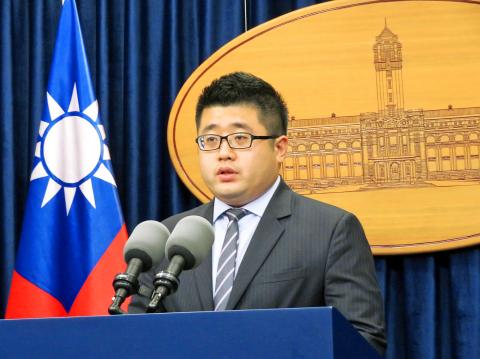The Taiwanese government yesterday welcomed the US Senate’s passage of its annual defense spending bill, which includes a provision calling on Washington to strengthen defense and security cooperation with Taiwan.
The US Senate on Monday passed its version of the National Defense Authorization Act (NDAA) for fiscal year 2019 with a vote of 85 to 10.
Under Section 1243 of the draft bill published by the US Senate, the US Department of Defense is urged to strengthen defense and security cooperation with Taiwan “to support the development of capable, ready and modern defense forces necessary for Taiwan to maintain a sufficient self-defense capability.”

Photo: Lee Hsin-fang, Taipei Times
The section also calls on Washington to support the acquisition of defensive weapons by Taiwan in accordance with the Taiwan Relations Act, particularly those needed for asymmetric warfare and undersea warfare, as well as to promptly review and respond to Taiwan’s requests for defense equipment.
Washington is also urged to take action to enhance the security of Taiwan through military exchanges, including US participation in appropriate Taiwanese exercises, such as the annual Han Kuang exercise, and Taiwanese participation in US drills, the bill states.
Support should also be provided to “exchanges between senior defense officials and general officers of the US and Taiwan consistent with the Taiwan Travel Act,” the bill said, referring to the act promulgated on March 16 that encourages high-level visits between US and Taiwanese officials.
The passage of the bill came weeks after the US House of Representatives passed its version of the NDAA in a 351-to-66 vote on May 24. The House version bears a few differences from that of the Senate, including a request under Section 1253 that the US secretary of defense consult with Taiwanese officials to conduct a comprehensive assessment on ways to enhance and reform Taiwan’s military forces.
It stipulates that a report should then be submitted to the appropriate US congressional committees within a year of the NDAA’s enactment, detailing a summary of the assessment and a list of recommendations and planned actions.
In addition, the House version does not call for mutual participation by US and Taiwanese officers in each other’s exercises.
The US Senate and US House of Representatives must iron out the differences before the bill can be signed by US President Donald Trump.
Ministry of Foreign Affairs spokesman Andrew Lee (李憲章) yesterday expressed his gratitude to the US Congress for including military exchanges in the latest NDAA version.
“As there are some differences between the NDAA versions of the US House and the US Senate ... they will have to negotiate on the differences before the bill can be signed by President Trump,” Lee said, adding that the ministry would pay close attention to further developments.
Presidential Office spokesman Sidney Lin (林鶴明) thanked the US Senate for supporting Taiwan’s national security and attaching importance to it.
“We will continue to engage in talks with the US government’s executive branch to strengthen security cooperation between the two nations,” Lin said.
Taiwan is also conducting a systematic upgrade of its defense capability to better safeguard the nation and ensure peace and stability in the region, Lin said.

CHAOS: Iranians took to the streets playing celebratory music after reports of Khamenei’s death on Saturday, while mourners also gathered in Tehran yesterday Iranian Supreme Leader Ayatollah Ali Khamenei was killed in a major attack on Iran launched by Israel and the US, throwing the future of the Islamic republic into doubt and raising the risk of regional instability. Iranian state television and the state-run IRNA news agency announced the 86-year-old’s death early yesterday. US President Donald Trump said it gave Iranians their “greatest chance” to “take back” their country. The announcements came after a joint US and Israeli aerial bombardment that targeted Iranian military and governmental sites. Trump said the “heavy and pinpoint bombing” would continue through the week or as long

TRUST: The KMT said it respected the US’ timing and considerations, and hoped it would continue to honor its commitments to helping Taiwan bolster its defenses and deterrence US President Donald Trump is delaying a multibillion-dollar arms sale to Taiwan to ensure his visit to Beijing is successful, a New York Times report said. The weapons sales package has stalled in the US Department of State, the report said, citing US officials it did not identify. The White House has told agencies not to push forward ahead of Trump’s meeting with Chinese President Xi Jinping (習近平), it said. The two last month held a phone call to discuss trade and geopolitical flashpoints ahead of the summit. Xi raised the Taiwan issue and urged the US to handle arms sales to

State-run CPC Corp, Taiwan (CPC, 台灣中油) yesterday said that it had confirmed on Saturday night with its liquefied natural gas (LNG) and crude oil suppliers that shipments are proceeding as scheduled and that domestic supplies remain unaffected. The CPC yesterday announced the gasoline and diesel prices will rise by NT$0.2 and NT$0.4 per liter, respectively, starting Monday, citing Middle East tensions and blizzards in the eastern United States. CPC also iterated it has been reducing the proportion of crude oil imports from the Middle East and diversifying its supply sources in the past few years in response to geopolitical risks, expanding

An Emirates flight from Dubai arrived at Taiwan Taoyuan International Airport yesterday afternoon, the first service of the airline since the US and Israel launched strikes against Iran on Saturday. Flight EK366 took off from the United Arab Emirates (UAE) at 3:51am yesterday and landed at 4:02pm before taxiing to the airport’s D6 gate at Terminal 2 at 4:08pm, data from the airport and FlightAware, a global flight tracking site, showed. Of the 501 passengers on the flight, 275 were Taiwanese, including 96 group tour travelers, the data showed. Tourism Administration Deputy Director-General Huang He-ting (黃荷婷) greeted Taiwanese passengers at the airport and